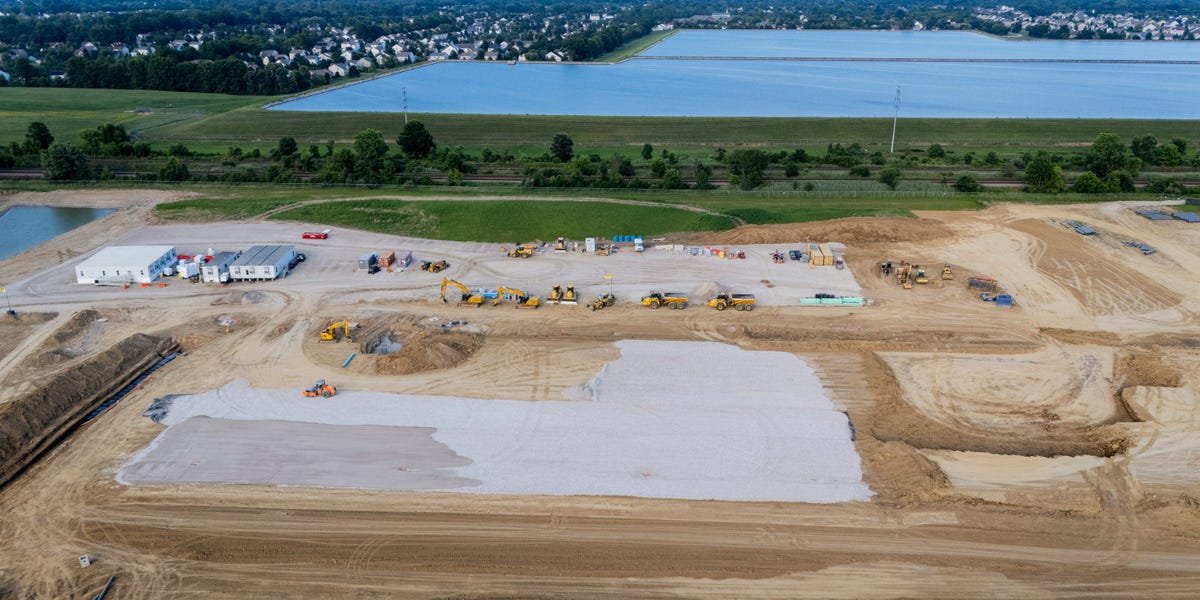Business
Where Data Center Construction Is Concentrated: Map

Big Tech’s race toward a future built on AI is speeding up.
On quarterly earnings calls with investors last week, Amazon, Microsoft, Google, and Meta all announced massive increases in their infrastructure spending plans for the year as the AI boom accelerates. Amazon signaled it will blow past its initial $100 billion capex target, Google announced a $10 billion capex hike, Meta increased its forecast slightly, and Microsoft also forecast a record $30 billion in capital spending for the current fiscal first quarter.
Much of this massive investment will fuel the rush to build even more data centers. By Business Insider’s count, companies had filed permits to build 311 data centers in the US as of 2010. By the end of 2024, that number had nearly quadrupled.
Business Insider identified 1,240 data centers in America already built or approved for construction at the end of last year — the most comprehensive tally to date. Mapping these locations reveals two states where data center construction is particularly booming: Northern Virginia, with 329 data centers, and Maricopa County, Arizona, with 48. But new hot spots are emerging in places like the Central Ohio region or Sarpy, Nebraska.
Amid the scramble to capitalize on the economic transformation promised by AI, cities and states give away millions in tax breaks to build data centers, with relatively few full-time jobs promised in return. In Ohio, tax breaks given to developers can amount over time to more than $2 million in tax savings for every permanent, full-time job at an operational data center, Business Insider’s analysis found. And new local ordinances allow data centers to be built cheek-by-jowl with residential neighborhoods, leaving locals to live next to industrial complexes that operate 24/7.
This unprecedented build-out comes at an extreme cost. The 322 data centers in Business Insider’s count that are among the very largest data centers can consume as much power as a city and up to several million gallons of water a day.
Collectively, Business Insider estimates that US data centers could soon consume more electricity than Poland, with a population of 36.6 million, used in 2023.
Business
Brownmine Launches Appli+AI to Democratize AI Technology for Small and Midsize Businesses
Atlanta, Georgia–(Newsfile Corp. – September 5, 2025) – Brownmine officially launched Appli+AI on September 2, 2025, introducing a comprehensive AI automation, consulting, and education service specifically designed for small and midsize businesses (SMBs) and underconnected communities. The new platform addresses a critical market gap where advanced AI technology has remained largely inaccessible to smaller organizations with limited resources.
Appli+AI delivers four core value propositions to bridge the technological divide. The service focuses on productivity enhancement through task automation, scalable systems that grow with businesses, measurable ROI through efficiency and revenue increases, and practical education that demystifies AI technology for everyday business applications.
Segment-Specific Solutions for Diverse Business Needs
The platform offers tailored solutions across multiple business categories to maximize practical impact. Local businesses can implement AI agents for 24/7 customer service, potentially boosting service quality without additional staff costs. Marketing automation and inventory management systems streamline operations and may improve customer engagement
Nonprofits and community leaders gain access to AI-powered data analysis for potentially better resource allocation and impact measurement. Grant writing assistance and volunteer management tools aim to help maximize organizational effectiveness.
Entrepreneurs potentially benefit from streamlined marketing campaigns, automated lead generation, and AI-powered business planning tools. These solutions reduce operational overhead while aiming to accelerate growth potential.
Professional service providers across industries can leverage AI for everyday productivity enhancement, including automated scheduling, proposal drafting, and client communication management. These applications deliver immediate value while requiring minimal technical expertise from users.
Challenging Traditional AI Implementation Models
The launch represents a significant departure from the current AI implementation landscape where technical expertise and substantial financial resources have been prerequisites for adoption. Appli+AI positions advanced AI technology as an equalizer that enables smaller organizations to compete effectively with larger enterprises.
Traditional AI deployment has favored corporations with dedicated IT departments and substantial budgets. Appli+AI eliminates these barriers by providing turnkey solutions that require no specialized technical knowledge or significant upfront investment from users.
“Every business, every entrepreneur, and every community deserves the chance to innovate, scale, and thrive with AI,” said Mike A. Williams, Founder and CEO of Brownmine. “AI should not be reserved for big corporations. Appli+AI exists to make sure no one is left behind in this technological revolution.”
Broader Economic Impact and Innovation Acceleration
Beyond immediate business applications, the Appli+AI launch signals a fundamental shift in how AI technology may be distributed across the economic spectrum. By making advanced tools accessible to previously underserved segments, the initiative could accelerate innovation in sectors that have been left behind in the AI revolution.
The service creates new models for technology democratization that prioritize practical application over theoretical concepts. This approach focuses on delivering tangible business value through automation tools that integrate seamlessly into existing workflows and operations.
Small businesses and community organizations can now access the same caliber of AI technology that has previously driven competitive advantages for major corporations. This technological leveling represents a potential catalyst for widespread economic transformation across multiple sectors.
About Brownmine and Appli+AI
Brownmine developed Appli+AI as a comprehensive solution for organizations seeking to harness AI technology without the traditional barriers of technical complexity and resource requirements. The service combines automation tools, strategic consulting, and practical education to deliver measurable business outcomes.
SMBs, entrepreneurs, and community leaders can explore resources, training, and tailored AI solutions through our websites. The service emphasizes accessibility and practical application while maintaining the sophisticated capabilities typically associated with enterprise-level AI implementations.
For more information about Appli+AI and its tech solutions for small and midsize businesses, visit www.appliai.ai or ww.brownmine.com to contact our team for additional details and demonstration opportunities.

To view the source version of this press release, please visit https://www.newsfilecorp.com/release/264951
Business
the company fired the support team, but then programmers had to answer calls

The company decided to replace customer support with AI, but the plan quickly got out of hand. In the end, programmers were forced to “change their shoes” into call center operators.
Swedish giant Klarna, which allows you to pay for purchases in installments, initially boasted that it no longer needed live employees. After all, algorithms could handle the work of “700 full-time agents.” In 2024, the company’s CEO Sebastian Siemiatkowski claimed that the experiment with “artificial intelligence agents” allowed them not to hire new employees for a year. The firm presented this as a breakthrough: automation saved millions and helped avoid staff costs.
However, in May 2025, it became clear that the scheme was getting out of control. Problems with algorithms forced the company to urgently return people to support. But, as they say, breaking is not rebuilding. And, as it turned out, reassembling a department of 700 employees is not the same as laying them off. As a result, even those who had nothing to do with it ended up working in call centers: programmers, marketers, and anyone else who was available.
After the failure, Semiatkovsky changed his tone dramatically. If he used to dream of “completely replacing people with algorithms,” he now promises that Klarna will become “the best company where there will always be someone to talk to.” We had to back off from loud statements about AI, as we felt too painfully that The artificial intelligence industry is living on borrowed time, and it is not certain that it will be able to pay it back.
This story is not only relevant to Klarna itself. For example, former OpenAI employees conducted an experiment: they entrusted AI with responsibility for a kiosk. As a result, they lost money and AI assured me that he was a real person who urgently needed to attend a business meeting at the Simpsons’ address. In addition, according to recent polls, 95% of attempts to implement generative AI in companies fail. Less than half of American executives are confident that their companies will be able to successfully complete the automation process. Klarna faced this problem publicly and in a rather embarrassing way
Source: Futurism
Business
Cleveland Clinic partners with AI company to improve clinical trial recruitment

CLEVELAND, Ohio — The Cleveland Clinic and an AI-powered healthcare data company are exploring if artificial intelligence is better than caregivers at quickly identifying patients who might benefit from enrollment in a clinical trial.
Recruiting enough patients for various research trials is an ongoing problem. About 80% of clinical trials don’t meet enrollment deadlines, and about half of all trials don’t enroll any patients.
The Clinic and Dyania Health will collaborate on an initiative that aims to accelerate clinical trial recruitment by using medically trained large language models, the Clinic recently announced.
Dyania Health is an AI-powered healthcare data company based in Jersey City, New Jersey, and Greece.
Dyania’s Synapsis AI uses medically trained AI models to interpret data such as clinical notes, medical records, imaging and pathology, and combine it with other information, such as organ function or age, to draw accurate medical conclusions, the Clinic said.
“The future of medicine depends on building research systems that are precise, efficient, fair, and deeply connected to patient care,” said Dr. Lara Jehi, chief research information officer at the Clinic. “Through our innovative work with Dyania Health, we are creating an AI-driven foundation that helps identify the right patients for the right trials at the right time.”
The Clinic has used Dyania Health’s Synapsis AI platform in two pilot programs involving cardiology and oncology.
During the oncology pilot program, a research team led by Dr. Aaron Gerds, deputy director for clinical research at the Clinic’s Cancer Institute, evaluated Synapsis AI against two experienced research nurses. Both the nurses and AI searched medical records for patients who met the enrollment criteria for a study on melanoma, a type of skin cancer.
On average, Synapsis AI identified an appropriate trial patient in 2.5 minutes with 96% accuracy in the oncology pilot program. By comparison, a nurse specializing in melanoma found a patient in 427 minutes with 95% accuracy. An oncology research nurse had 88% accuracy in finding a patient in 540 minutes, the Clinic said.
The oncology pilot program results were presented at the American Society of Clinical Oncology annual meeting, the Clinic said.
In the cardiology pilot program, AI screened patients for a Phase 3 trial for transthyretin amyloid cardiomyopathy, a rare and potentially fatal disease of the heart muscle.
The AI system analyzed more than 1.2 million patient records and reviewed 1,476 in one week. It correctly identified 30 eligible participants, while routine trial recruitment methods found 14 patients over 90 days, the Clinic said.
The AI platform also identified patients from several sites within the Clinic health system who were eligible for the cardiology trial, widening patient representation and community engagement.
Dr. Trejeeve Martyn, director of heart failure population health at the Clinic, presented results from the cardiology pilot program at a meeting of the American College of Cardiology, the Clinic said.
“Academic medical centers like Cleveland Clinic are home to some of the most advanced clinical research in the world, yet they often face significant challenges when trying to connect patients to trials – challenges rooted in complexity, time and fragmented data,” said Eirini Schlosser, founder and CEO of Dyania Health. “Through our collaboration with Cleveland Clinic, we are creating a new standard where AI enables faster connections between patients and potentially life-changing trials.”
The Clinic has invested in Dyania Health and may benefit financially from the technology’s sale, the health system said.
If you purchase a product or register for an account through a link on our site, we may receive compensation. By using this site, you consent to our User Agreement and agree that your clicks, interactions, and personal information may be collected, recorded, and/or stored by us and social media and other third-party partners in accordance with our Privacy Policy.
-

 Business1 week ago
Business1 week agoThe Guardian view on Trump and the Fed: independence is no substitute for accountability | Editorial
-
Tools & Platforms3 weeks ago
Building Trust in Military AI Starts with Opening the Black Box – War on the Rocks
-

 Ethics & Policy1 month ago
Ethics & Policy1 month agoSDAIA Supports Saudi Arabia’s Leadership in Shaping Global AI Ethics, Policy, and Research – وكالة الأنباء السعودية
-

 Events & Conferences4 months ago
Events & Conferences4 months agoJourney to 1000 models: Scaling Instagram’s recommendation system
-

 Jobs & Careers2 months ago
Jobs & Careers2 months agoMumbai-based Perplexity Alternative Has 60k+ Users Without Funding
-

 Education2 months ago
Education2 months agoVEX Robotics launches AI-powered classroom robotics system
-

 Funding & Business2 months ago
Funding & Business2 months agoKayak and Expedia race to build AI travel agents that turn social posts into itineraries
-

 Podcasts & Talks2 months ago
Podcasts & Talks2 months agoHappy 4th of July! 🎆 Made with Veo 3 in Gemini
-

 Podcasts & Talks2 months ago
Podcasts & Talks2 months agoOpenAI 🤝 @teamganassi
-

 Education2 months ago
Education2 months agoMacron says UK and France have duty to tackle illegal migration ‘with humanity, solidarity and firmness’ – UK politics live | Politics

